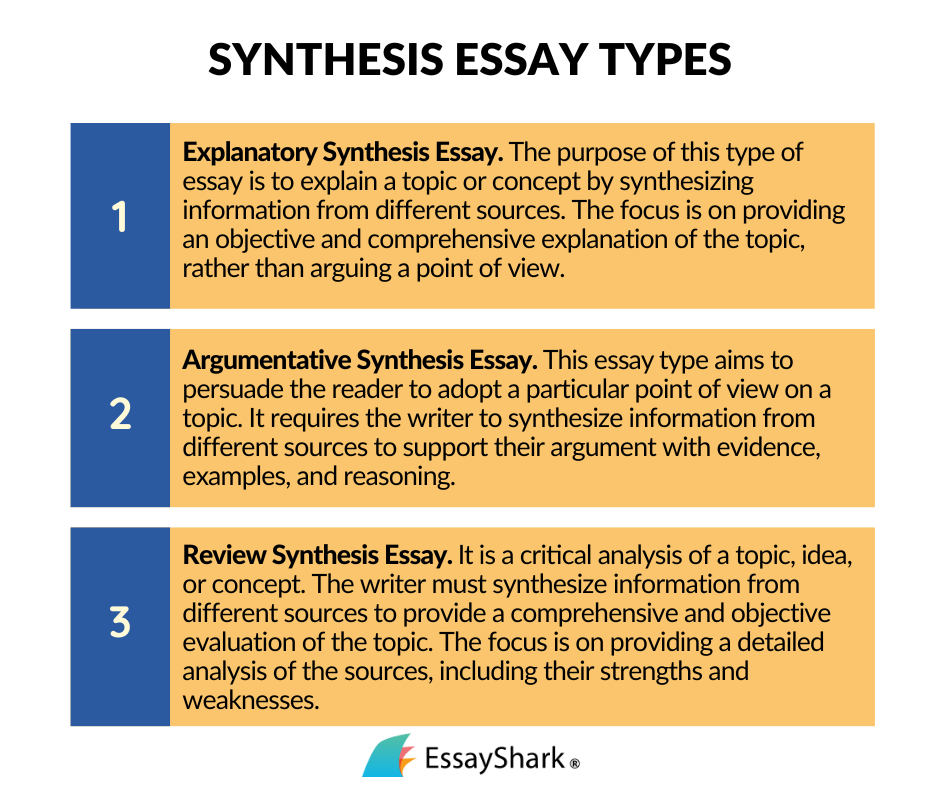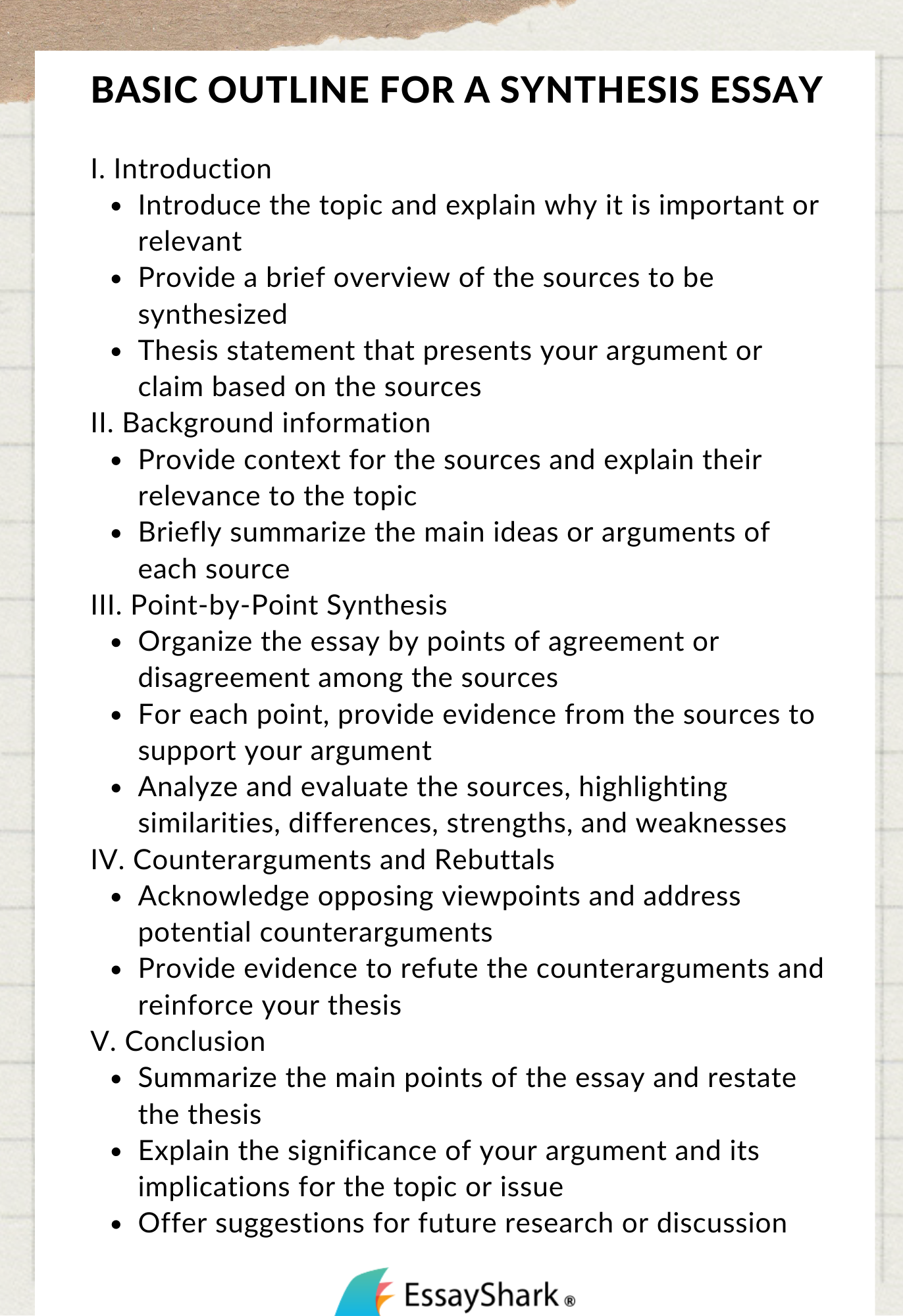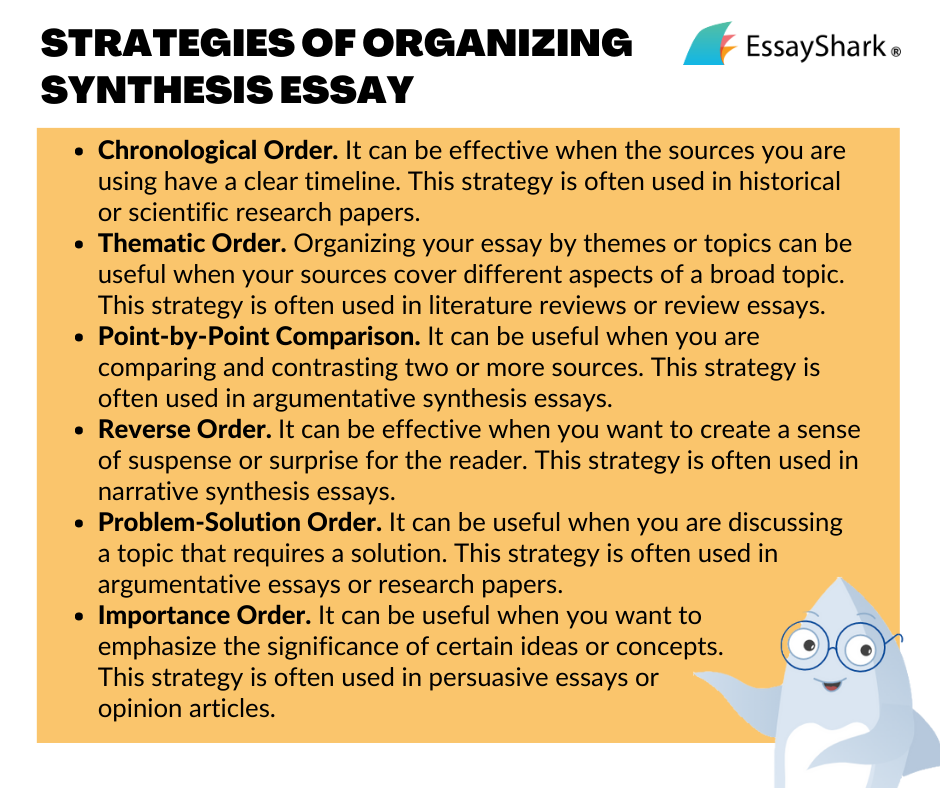Synthesis essays are not as popular as argumentative or analytical essays. Still, you can be assigned to write this type of essay when you study at high school, college, or university. Writing a synthesis essay is also a part of an exam that you have to pass in order to complete the AP English Language and Composition course. As this essay type is uncommon, we will provide you with a detailed and simple guide on how to write a synthesis essay.
Table of contents
What is a synthesis essay?
A synthesis essay is a type of writing that offers a unique viewpoint on a chosen topic backed up with information from multiple sources. It is similar to research papers but has a few limitations.
Firstly, when you write an AP synthesis essay, you don’t have to look for the necessary sources by yourself, as they’re provided in the text of your assignment. The only thing you need to do is pick three or four sources in order to argue the topic. Secondly, you’ll have certain time limitations during the exam. You will have to complete three writing tasks (argument, analysis, and synthesis) in two hours. Finally, topics for synthesis essays are usually broader than ones for research papers.
The AP English Language and Composition exam is not aimed at evaluating students’ knowledge of a specific discipline. Its main purpose is to examine your writing and rhetorical skills, so all topics are debatable and understandable, as they don’t require reading specialized literature.
In general, a synthesis essay has to demonstrate your language competence, not your analytical thinking skills. Still, you should follow a particular logic to make your text readable and to get a higher score.
Main types of synthesis essays

Synthesis essay writing steps
When you compose a synthesis essay, especially for the AP exam, you don’t have much time. Therefore, you need perfect planning. Below, we offer you writing steps divided into three stages for your comfort.
Preparatory work
1. Read instructions thoroughly
Understanding the prompt is crucial for providing a brilliant synthesis essay. Make sure that you take into account all the aspects of the topic.
2. Think about the topic
Sure, you won’t have much time for a full-scale brainstorming session during the exam. Still, you have to look at the suggested theme from different perspectives in order to formulate your unique and interesting viewpoint.
3. Compose a preliminary thesis statement
Write down the first clear idea that will come to your mind after you read the prompt. It doesn’t need to be perfect, as you’ll have a chance to make changes later. The main purpose of this step is to create a base for the further writing process. A good thesis statement is a sentence that answers three questions about your essay at the same time: what, how, and why.
4. Choose sources
When taking an exam, this step is easier than when doing an academic assignment, as all the sources are specified. You have to pick three or four sources of various formats that will enforce your point of view. If you are preparing a synthesis essay for a university, you can use more than four sources, but make sure that you analyze and present properly the ideas of each author.
4. Read the chosen sources thoroughly
Remember that you don’t have much time when you take the exam, so don’t waste it for reading all the provided sources. Only after picking several texts will you begin a detailed reading. You can make short annotations and take notes in order to summarize the main ideas of the chosen sources.
5. Find connections between the sources and your claim
This is the main aspect of any synthesis essay. If you don’t succeed in finding out and explaining to your readers how the chosen sources are related to your thesis, you won’t get a high score for your essay. The sources that you choose shouldn’t necessarily prove your point of view. They can even be contradictory, but links between them have to be clear.
Drafting your essay
To simplify the writing process, we suggest you to use a standard five-paragraph structure: one paragraph for your introduction, three paragraphs for the main body, and one more for your conclusion.

Let’s take a closer look at each part of a synthesis essay.
1. Introduction
An introduction is an extremely important part of your essay, as it has three crucial functions. First of all, you introduce your topic and provide some background information that is necessary for understanding the theme. The next task is to present your sources, as they provide the base for your synthesis essay. Finally, you include your thesis statement in your introduction. Don’t forget that your claim should be relevant to your body paragraphs. As a rule, an introductory section is about 10% of the whole text and consists only of one paragraph.
2. The main body
This part covers about 80% of your synthesis essay. Each paragraph should include a focal point and several quotes that serve as arguments. You should follow the rule of one paragraph, one idea. However, don’t omit the logical connections between parts of the main body and different sources. Your main purpose is to show how you can synthesize multiple sources in order to prove your personal point of view.
3. Conclusion
When you write the concluding part of your essay, the main thing is to show confidence. A confident tone will persuade your readers that your viewpoint is correct and your argumentation is immaculate. Restate your thesis statement and summarize connections between your initial claim and cited sources. Be concise and avoid long phrases: your conclusion should be only 10% of the whole text.
Final touches
1. Reread your essay
It is hard to do everything perfectly on the first try. In order to notice all the mistakes and inaccuracies, reread your writing thoroughly.
2. Write a final thesis statement
Make sure that your thesis statement is relevant to the main body. If not, rewrite it to create a smooth connection between your claim and argumentation.
3. Edit your text
If you’re sure that everything is fine with the content of your synthesis essay, it’s time to get rid of grammatical mistakes, poor wording, spelling mistakes, and incorrect punctuation. Remember that even the most eloquent text will look like the work of an amateur if there are dozens of mistakes.

AP lang synthesis essay
On the AP Language and Composition exam, you will need to write a synthesis essay as part of the free-response section. For this essay, you will be provided with prompts and several sources to support your argument. To prepare for this essay, it is important to read through each source carefully, take notes, and create an outline before starting to write. Remember to include at least three sources in your essay and to cite them properly. Here are some important facts to keep in mind about the AP Lang Synthesis Essay:
- Purpose. The synthesis essay is a type of exam paper that students write to show their analytical skills and ability to work with sources and write essays based on them.
- Time limit. The work time is 55 minutes.
- Organization. Composition of the synthesis essay is the following:
- Introduction with a thesis statement.
- Argument from the source No. 1.
- Argument from the source No. 2.
- Argument from the source No. 3.
- Conclusion.
- Compliance with the topic. You should stay on topic and support the chosen quote or question.
- Argumentation using several sources. The point of a synthesis essay is to confirm your statements, using as examples the sources you have given.
- Composition and logic of reasoning. The criterion implies adherence to semantic division into paragraphs, logical sequence of presentation of thoughts, as well as constructive proof of one’s opinion.
- Quality of writing style. In the synthesis essay, use diverse speech structures, but ones that are correct grammatically, syntactically and lexically.
Synthesis essay topics
How to choose an exciting topic for a synthesis essay
A synthesis essay is an opportunity to share your opinion on two or more texts. You will need to analyze a particular issue and support your point of view with evidence. This type of essay is common in high school and college English courses.
When choosing a topic for your synthesis essay, you need to find a way to connect the sources. Connecting different sources to support your point to make a perfect essay can be done by finding a common theme or providing a critical analysis of each source. If you are still looking for a connection, try looking for a common thread that ties the sources together.
Once you have found a connection, you must decide what direction you want your essay to take.
- Do you agree with the sources?
- Do you disagree?
- Do you see a different perspective?
Your position will be the basis for your synthesis essay.
20 creative topics for a synthesis essay
- The American Dream: Is it still achievable?
- Technology has made our world a better place
- Social media is a positive or negative force in our world
- The media is responsible for the way we see the world
- The definition of success: What does it mean to be successful?
- The role of the government: Should it be more involved
- The importance of a college education
- The challenges of being a first-generation college student
- The pros and cons of genetic engineering
- The implications of climate change
- Agree or disagree: The only way to be a successful student is to get good grades
- Reality television is harmful to our society
- The importance of failure
- The impact of social media on relationships
- Fake News: Is the spread of fake news a problem?
- Technology: What will be the next significant innovation?
- Social Media: Is social media a form of addiction?
- The pros and cons of technology in the classroom
- Family: How has the traditional family structure changed?
- Religion: How has faith changed over time?
Why do you need to explore expert samples
As you know, a synthesis essay is about drawing information from various sources and piecing it together to create a cohesive whole. The process can be tricky and one that can be made much easier with the help of expert samples.
1. It can be difficult to identify all the necessary elements independently
When looking at a blank page, it can be challenging to know where to start. It, therefore, becomes more challenging when tasked with writing a synthesis essay since you need to include so many elements that can be difficult to identify without the help of an expert. Thus, this is where expert samples come in handy. By reading through a few examples, you can better understand what’s required and what’s optional.
2. You’ll be able to see how different writers approach the same topic
One of the great things about exploring expert samples is that you’ll be able to see how other writers approach the same issue. Subsequently, this can give you valuable insights into how you might want to approach your essay.
3. You can learn from the mistakes of others
While reading through expert samples, you’ll inevitably come across some that are better than others. Consequently, this is an excellent opportunity to learn from the mistakes of others and make sure that you don’t make the same mistakes in your essay.
4. You’ll get a better sense of what the professor expects
If you need clarification on what your teacher or professor is looking for, expert samples can be a great way to give a better experience of what the professor expects. Reading through a few expert examples gives you a clearer idea of the professors’ expectations, and you can formulate your thoughts.
5. You can find inspiration for your essay
Finally, one of the best reasons to explore expert samples is that they can provide much-needed inspiration. If you’re stuck, a few well-written examples can jumpstart your creative process and help you develop great ideas for your essay.
5 helpful tips to write a synthesis essay
1. Acceptable number of sources
If you need to take the AP exam, you have to use at least three sources (you can use a maximum of four sources). If you must write a synthesis essay as an academic assignment, you may use more sources. However, we don’t recommend you to exceed the limit of six sources, as it can be very hard to present a greater number of works in a proper way. You can cite the same source several times, and it will still be considered as one source.
2. Proper citation
When you include a quote in your essay, introduce, punctuate, and cite it properly. Mention the author’s name and use quotation marks if necessary. In parentheses, write the title of your source.
3. Counter-argument
Addressing a counter-argument is a helpful argumentation strategy. In such a way, you demonstrate that your point of view on this particular topic is not unique. However, you can show that the counter-argument is weak, and this will convince your readers that your claim is more valid.
4. Language skills
This tip is mostly accurate for the AP exam. The free-response writing section, which includes a synthesis essay, is aimed at evaluating your language performance. Don’t hesitate to use fancy wording, terms, complex grammar structures, linking words, and figures of speech that will demonstrate your language skills.
5. Importance of the form
The main purpose of the synthesis essay is to show how you can use multiple sources and create connections between them and demonstrate your writing skills. Your top priority is not offering a unique point of view that will amaze your readers. Of course, a bit of novelty won’t hurt. Still, your primary task is to be eloquent and logical, not creative.
We hope that you’ve learned more about a synthesis essay thanks to our guide. Practice your writing regularly in order to achieve great results and get higher scores!
If you need help with writing, or other types of assignments, you can count on us. For example, reqest do my math homework help, or write my essay for me, and get qualified assistance.








